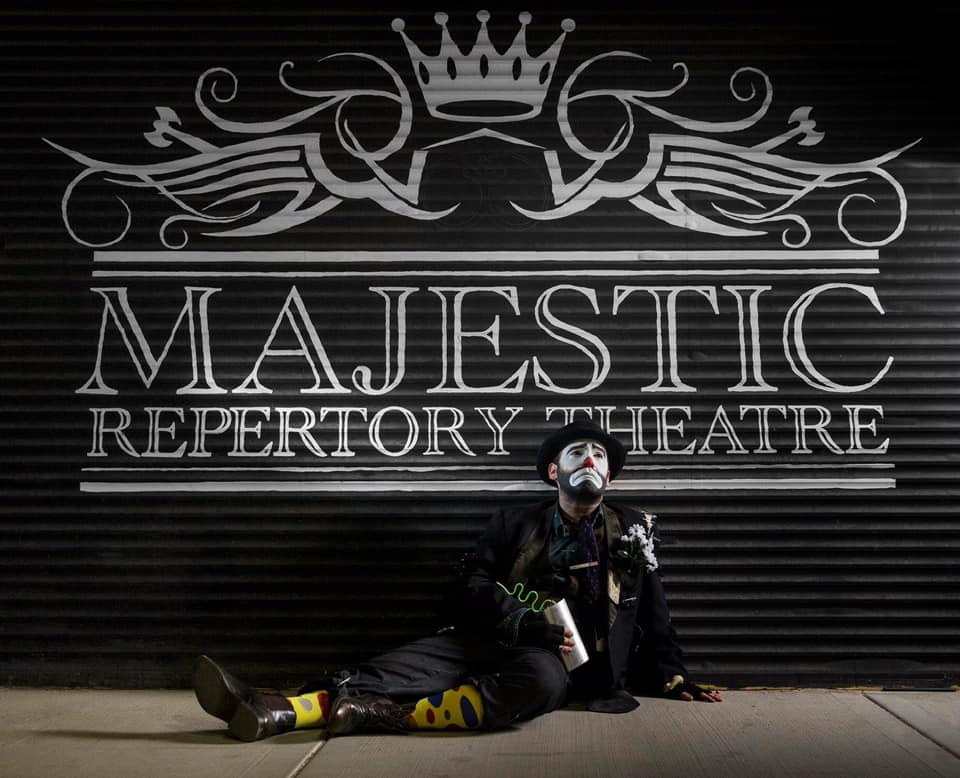
Interview with Troy Heard, Immersive Theatre Director
Troy Heard is an immersive theatre director and the Founding Artistic Director of Majestic Repertory Theatre in Las Vegas. His work has been featured in the New York Times and USA Today. He has also created immersive experiences for brands looking to create interactive marketing events. We spoke with him about how he came to be involved with immersive theatre, the challenges in creating productions that require audience participation, and how they have adapted to virtual spaces in the wake of the COVID-19 pandemic.
88 Names: Please tell us a little bit about yourself. What is immersive theatre? And how did you come to be involved in it?
Troy: I’m a Gen Xer from a small Georgia town, and I grew up on a steady diet of Spielberg films and slasher flicks, so I knew that as an adult I’d either want to make horror movies or haunted houses. Through a series of events, I was diverted into the world of live theatre instead (how does that even happen?), but was always hungry to bring audiences into the worlds I created. During my undergrad years I staged a replica of a 1920s seance. The audience was invited to participate while I filmed it verité-style for a “documentary.” This was the Blair Witch era and nobody understood why the walls were broken down between the actors and audience, but they went along for the ride. Then five years ago my friend and frequent co-director Natalie Senecal and I wanted to explore the cult mentality and why people are attracted to them. So we accessed the FBI files of Jim Jones and devised an experience that moved audiences from a sermon at the Peoples’ Temple in San Francisco to the final day at Jonestown, Guyana, complete with the Flavorade line. We didn’t realize back then that there was soon going to be a name coined for this: immersive theatre.

Troy Heard
88 Names: What are some of the biggest challenges you face developing immersive productions—from an internal perspective with logistics and actors? And from an audience perspective—I think it’s a little intimidating for audiences to interact in a performance?
Troy: The process of creating any immersive experience is always outward facing. For example, if you’re writing a screenplay or traditional stage play, you have characters who move forward on a trajectory—the plot. Conflicts arise, obstacles are overcome, there’s a climax, roll credits. Although those elements are present in immersive theatre, there’s also a huge unknown factor—the presence of an audience member who may or may not have the agency to manipulate that forward moving trajectory. Internally, there’s the matter of timing. When audiences split off into scenes with different characters, these tracks usually have to intersect at key points. And if one scene is finished while another is running too long—and if an audience member is in it to win it—that happens—then the actors have to know how to vamp. Conversely, actors also have to learn how to organically pull audience members back on track without completely shutting them down. We train our immersive performers to be psychologists as much as actors—you have to be attuned with your guests and observant of the non-verbal clues they’re offering. If they want to play, that’s great; if they don’t want to play, that’s a very valid choice as well. And performers still have to craft the experience that satisfies their needs.
88 Names: In a couple of our podcast episodes, we’ve spoken with Brandon Oldenburg, an Academy Award winning film director who now works in developing VR games, stories, and experiences, and Noah Nelson, founder of No Proscenium, a publication that explores immersive arts. Both touched on the challenges in making VR experiences that allow audiences to explore open worlds while also telling a story. Do you see a place for storytelling that crosses over between a physical immersive experience and a VR space?
Troy: For Majestic Repertory Theatre, VR is the next frontier. I know there’s a challenge creating an entire world and having an audience member “go rogue,” but for us that’s a dream. I think with the right technology partner, we can take our storytelling chops to the next level.
88 Names: Physical spaces have been mostly shut down now due to the COVID-19 pandemic. You’ve put together a few online, virtual events in the wake of that. Can you talk about those?
Troy: We were entering the second week of our newest show “The Garden Party” when we made the call to close down. Once the WHO declared this a pandemic, we knew there would be no possible way an audience member could come to the show without having this “thing” in the back of their minds. A week later, the governor called the mandatory shut down. But it did feel like we dropped the car to neutral just as soon as we hit sixty miles per hour, and didn’t want to stop. So we took one of the characters, Reverend Eugene Dolor, and slapped him on Instagram Live with a dial-up sermon called “Dial S for Salvation.” We literally did this on the cuff with absolutely no planning, which isn’t always the best way to do things—it wasn’t until five minutes before we went live that we decided a tornado was on its way to the small fictional town of Wycliff Falls and the Reverend had to get five people to confess their sins and pray the disaster away. We did it mostly for ourselves. But the response from viewers was so positive we continued on over the next few weeks. There was a lot of “thank you’s” going on, and several people saying that being able to laugh was the best thing that had happened to them since the shutdown.

88 Names: What do you see as the value in telling stories in this way, as an immersive experience rather than just a fixed perspective?
Troy: I think it’s as simple as comparing a movie to a video game. They’re both satisfying, but one gives you more control and lets you become a character. Sometimes you feel like diving into a new world, sometimes you want to sit back and be entertained. I like to be able to hop between the different forms, for sure. But I’ll always be moved by the moments in our immersive shows when actors tell me that an audience member had a real moment of vulnerability and shared a connection with them. Immersive theatre is the only medium where this can happen.
88 Names: What projects are you working on next? We’re all still unsure of how our current situation ends. How are you approaching your next steps?
Troy: The ladies of the Wycliff Falls Garden Club are due to return…we struck the right balance of comedy, terror, and satire in “The Garden Club” so it’ll be remounted eventually. Before the shutdown, we were talking about taking our production of “Krampus” to Los Angeles this Christmas and I started writing our first large scale open sandbox show, “Spirit of ‘76,” which is a high school graduation bonfire set during the American bicentennial. The looming question, of course, is when will it be safe. Right now theatre makers across the globe are discussing Best Practices. What does social distancing mean in the audience as well as on and backstage? How do you disinfect an auditorium? If the audience isn’t safe, I can’t ethically say, “Come on back.” Fortunately we’ve been able to create intriguing small shows, so we’re going to lean into the pandemic. We’re creating curbside theatre, drive-through style, which are small performance art things with no contact. When we can phase in audiences, we’ll do tiny shows for tiny audiences—premium style with major distancing, face masks, and bottles of anti-bacterial lotion. I do believe we’ll reach a new normal, eventually, that isn’t a dystopian nightmare. It won’t be for a while, but it’ll come.
About The Author

Darryl A. Armstrong
Darryl A. Armstrong works in marketing and advertising and writes about pop culture. He is the Managing Editor at Rise Up Daily and his work has been featured in Bright Wall/Dark Room, Film Inquiry, and the Arts & Faith Top 100 Films list.